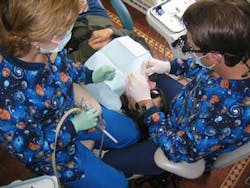Thursday Troubleshooter: Help! I can't adjust my chair properly to assist the short dentist
QUESTION: Does anyone have this problem? My dentist is very short so he lowers patients all the way down to the ground. I keep adjusting my assistant chair all kinds of ways to see what works for me, and nothing seems to help. I find myself standing more often than not because I’m leaning too much on my left side. My side and back hurt at the end of the day because I’m leaning so much. Argh! What to do! Any suggestions?
ANSWER FROM SUSAN KULAKOWSKI, PMC of DDS Consulting LLC:
Compromising in this way daily over time may possibly result in long-term physical impairment. If you haven’t already done so, I recommend this assistant discuss the situation with the doctor to determine a mutually beneficial ergonomic chair position. If the doctor's or assistant's chairs are dated and worn, it may be time to invest in new chairs that are more functionally designed and ergonomically suitable.
ANSWER FROM BETHANY VALACHI, PT, MS, CEAS, Dental Ergonomic Consultant/International Speaker/Author:
It sounds like your assisting stool may not adjust low enough, which is an unusual problem. If this is the case, contact the manufacturer of the stool and ask for a regular (operator) height cylinder. These can usually be easily swapped out with the taller assistant cylinder.
Standing is usually a great option for assistants, however, if you are tall and your doctor is short, this is an ergonomic nightmare. In these cases, the assistant seated on a regular height saddle stool with a torso support bar is a nice option for getting low enough and in close proximity to the patient. Crown Seating offers these customized assistant saddle stools.
It also sounds like you are leaning excessively. Remember two things — 1) The torso support bar should not be a “belly” bar. It should be positioned close to your side to double as an armrest. 2) Are you positioning yourself close enough to the patient? Unless your left hip is at your patient’s left shoulder, you are probably sitting too far back and leaning excessively, which is a precursor to low back pain. However, if you sit this close, your knees (heaven forbid) may touch the doctor’s knees. See the photo, which shows the interlocking knee position. Most of Europe and Asia position like this to give the assistant a healthy upright posture. It is just in North America where we are so uptight about “touching” and personal space, so therefore this type of healthy sitting is often not considered.
ANSWER FROM TINA M. CALLOWAY, CDA, DAICP, Dental Seminars, Workshops, and Clinical Assistant Coaching:
A correct and comfortable seated position for the clinical assistant is an important and often challenging concern. Many assistants do not realize the constant unbalanced sitting position they face in dentistry every day, or sometimes they realize it too late when they begin to have aches and pains.
A solution we have found in our practice is the use of an arm-free saddle chair. By using this type of chair, the assistants and hygienists are able to adjust easily no matter the height of the dentist or assistant. The saddle chair works especially well with tall teammates to allow more leg room when assisting, and without the arm it also allows freedom of range left, right, forward, or backward while using correct posture, which allows for proper balance and reduced stress to the spine. There are different styles and brands to these saddle seats, which can also have custom attachments placed by the manufacturer. In our office we have tried the Sally saddle, Patterson saddle, and RGP straddle assistant. For our team we have found the RGP straddle assistant to be the most comfortable and effective in seat contour, comfort, and freedom of range.
PAST THURSDAY TROUBLESHOOTERS:How do I handle the previous dental hygienist's poor patient treatment?
RDAs feeling overworked and underappreciated
New dentist has poor presentation skills, confuses patients
Do YOU have a tough issue in your dental office that you would like addressed?
Send your questions for the experts to answer. Responses will come from various consultants associated with Speaking Consulting Network and Dental Consultant Connection. Their members will take turns fielding your questions on DentistryIQ, because they are very familiar with addressing the tough issues. Hey, it's their job.
Send your questions to [email protected]. All inquiries will be answered anonymously every Thursday here on DIQ.


